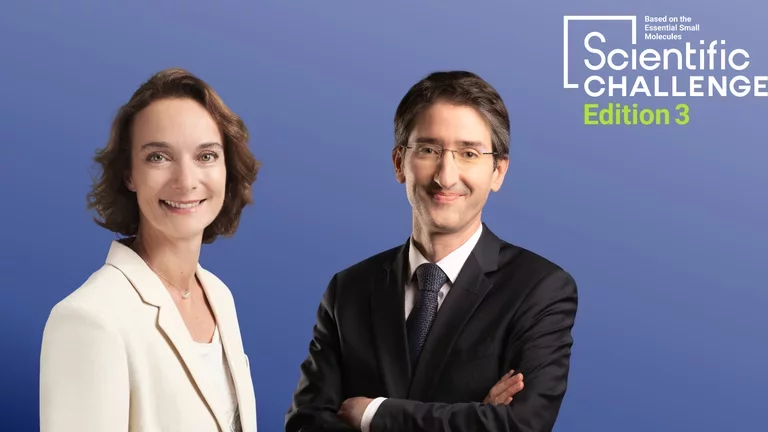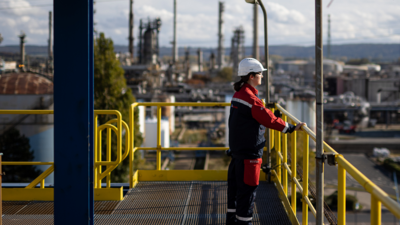2023 Scientific Challenge: Air Liquide announces the three winners
Published on November 23, 2023
5 minutes

Air Liquide has selected the winners of its 2023 Scientific Challenge, out of 119 proposals from 29 countries. Armelle Levieux, member of Air Liquide’s Executive Committee and Vice President of Innovation, and Jérôme Christin, Vice President of R&D, tell us what is at stake in this challenge and reveal the three winners of the 3rd edition of the Air Liquide Scientific Challenge with the objective to help identify and accelerate pioneering solutions to decarbonize industrial ecosystems using data and our Essential Small Molecules.
Jérôme, could you remind us what the Scientific Challenge is about?
The Air Liquide Scientific Challenge is a call for proposals to the international scientific and innovation community (academics, industrials, start-ups, etc.). Organized by R&D, it aims at contributing to accelerate the development of pioneering solutions. This is also a way for us to identify new partners for long-term collaborations. The first two editions were incredibly successful. They enabled us to establish 6 collaborations with 7 universities around the world. Together, we have filed 18 patents, issued 13 scientific publications, and created even one start-up. We expect to do the same with this new edition focused on decarbonization, which is a major challenge for the planet!
The Group invited teams of researchers, start-ups, private and public institutes to submit scientific research projects aimed at decarbonizing industrial ecosystems using data and our Essential Small Molecules such as oxygen, hydrogen, carbon dioxide. We have received more than one hundred proposals from 29 countries. This 3rd edition is clearly a success! We had very interesting ideas and I can say the selection was difficult to make!
Armelle, could you explain how this challenge contributes to accelerating our innovation?
Innovation & Technologies are one of the pillars of our ADVANCE strategic plan. Each edition of our Scientific Challenge gives disruptive insights that are then transformed into fruitful collaborations with academic partners delivering tangible results. I am delighted to see that this new edition had a great outreach, illustrating the willingness of the worldwide scientific community to collaborate with Air Liquide in order to invent pioneering technologies to collectively fight climate change.
So now, Jérôme, tell us who won…
I am very happy to announce that the winners are:
- Can Li, Davidson School of Chemical Engineering, Purdue University, USA, for his proposal to meet the challenge of “Data sharing for decarbonization”. The proposal focuses on the development of algorithms facilitating data sharing, combining incentive, data privacy and distributed optimization among the players to reduce CO2 emissions in industrial ecosystems.
- Luis Miguel Madeira, Faculty of Engineering, University of Porto, Portugal, for his project tackling the topic “Energy storage using Essential Small Molecules”. The idea consists in developing a new technology to produce methane (CH4) as energy carrier, from industrial captured CO2 alongside with low carbon hydrogen (H2), based on an innovative cyclic system.
- Enrico Tronconi, Department of Energy, Politecnico di Milano, Italy, for his proposal to take up the challenge of “Electric Heating for H2 production”. The proposal is a new technological process enabling an efficient electrified Steam Methane Reforming process based on a new conductive device harnessing the resistive heating, in order to produce low carbon hydrogen while reducing the energy consumption, and thus the CO2 emissions.
These three projects were selected by a prestigious jury*. Each winner will receive the “Air Liquide Scientific Prize” and a grant of €50,000. In addition, their scientific works will be funded through a partnership with the Group, to develop their innovative proposals and to transform them toward market-ready technologies.
Armelle, you are the new VP Innovation, what is your take on this type of collaboration?
I am convinced that partnering with some renowned Universities on some topics is an efficient way to accelerate the time-to-market of innovative solutions and to stay ahead of the game. Exchanges and collaboration between Air Liquide and academics, industrials and start-ups are key to have new ideas emerge and to accelerate the development of innovative solutions. These collaborations are of paramount importance to help our experts and R&D teams think outside the box while continuously enhancing their customer-centric approach. I was very impressed by the role played by our teams not only on the definition of the topics but also on the selection phases. And from now, R&D teams from Delaware, Paris and Frankfurt Campuses are beginning new collaborations with the three winners.
But for now, let’s congratulate the winners and wish them all the best to turn their ideas into reality!

